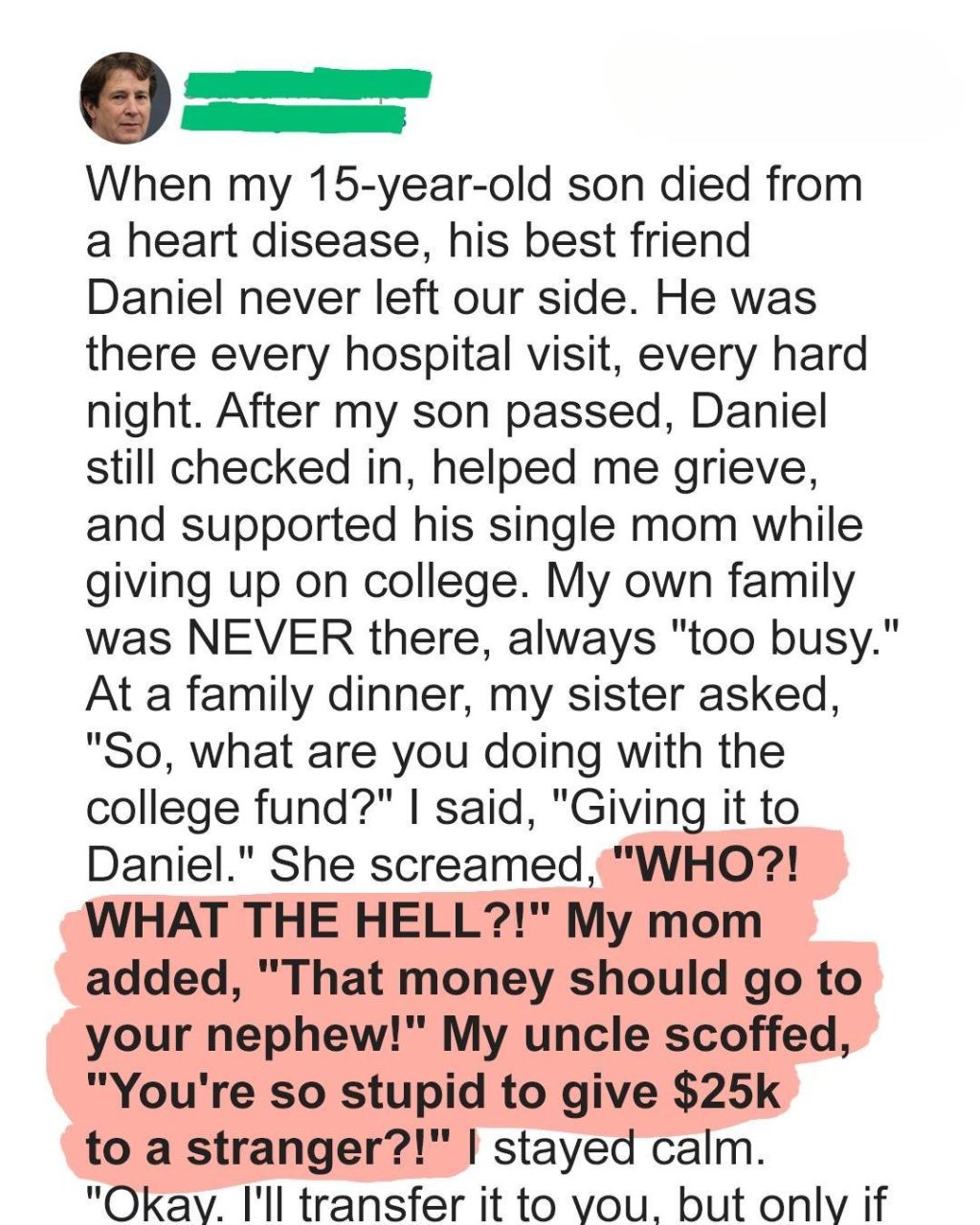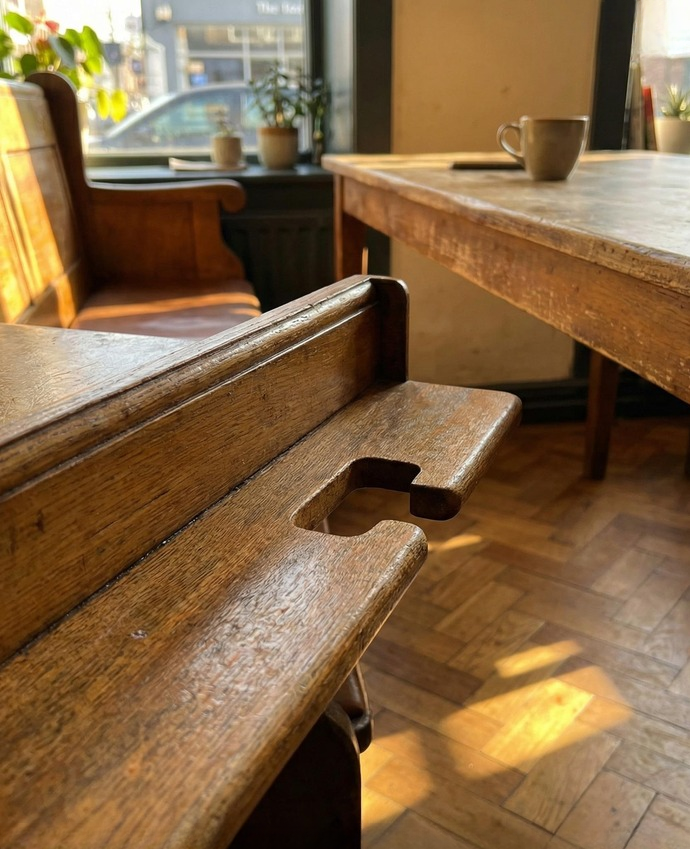
When my 15-year-old son died from a heart disease, his best friend Daniel never left our side. He was there at every hospital visit, every long night, every moment when grief swallowed the room and no one knew what to say.
After my son passed, Daniel continued to check in. He helped me grieve. He supported his single mother. And he quietly gave up on starting college so he could work full-time to help her.
My own family was never around. They were always “too busy,” always “dealing with their own things,” always sending excuses instead of support.
At a family dinner, my sister asked, “So… what are you doing with the college fund?”
I said, “I’m giving it to Daniel.”
She screamed, “WHO?! WHAT THE HELL?!”
My mom added, “That money should go to your nephew!”
My uncle scoffed, “You’re so stupid. You’d give $25,000 to a stranger?!”
I stayed calm. “Okay,” I said. “I’ll transfer it to you—
but only if you can tell me where you were when my son was dying.”
The table went silent.
My sister’s jaw clenched as if she had a retort ready, but the words wouldn’t come out. My mom shifted uncomfortably, looking down at her plate. My uncle opened his mouth, then closed it again like a fish out of water.
No one spoke.
I let the silence stretch. Let it sit heavy. Let it remind them of every hospital room they never walked into, every phone call they ignored, every moment they chose convenience over compassion.
Finally, my sister muttered, “…We were busy.”
I nodded. “Exactly.”
I stood up, placed my napkin beside my untouched plate, and added, “Daniel was never too busy.”
Then I walked out.
The Weight of the Decision
Driving home that night, I kept replaying the room’s stunned silence in my mind. My son’s college fund had always been a painful reminder—a future he’d never get to experience. But giving it to Daniel felt right.
Daniel had been more than a friend; he had been my son’s anchor, his brother in every way except blood. The night before my son’s final surgery, they sat holding hands, whispering plans for the future. They had promised each other they would both go to college—no matter what.
But life had other plans.
When my son passed away, Daniel’s entire world collapsed too. Yet he still showed up. For me. For my wife. For his mom. For everyone except himself.
He deserved a chance.
The Call I Didn’t Expect
Early the next morning, my phone buzzed. Daniel.
“Sir? Can I come over?”
He never called me “sir,” only Mr. Thompson or just Tom when he forgot. Something was wrong.
“Of course,” I said.
Ten minutes later, he was standing on my porch, hands stuffed in his hoodie pockets, eyes red like he hadn’t slept.
“I heard what happened at the dinner,” he said quietly. “Your sister called my mom and… well… she was yelling.”
Of course she was. I sighed.
Daniel took a breath. “I’m sorry if I caused trouble.”
My heart cracked a little. “Daniel,” I said, “you didn’t cause anything. This is my choice.”
He shook his head. “I can’t take that money. It’s for your son.”
I stepped closer. “Daniel… you were part of his future. And you are part of mine now.”
His chin trembled. He tried to blink it away, but one tear slipped down anyway.
“I miss him,” he whispered.
“I do too,” I said.
We stood there for a moment, sharing a grief only we understood.
A Memory I Had Almost Forgotten
I invited him inside. As we sat in the living room, Daniel looked around a little sadly.
“You kept everything like he left it,” he said.
“I’m not ready to change it yet.”
Daniel nodded, then hesitated. “Do you remember the notebook he carried everywhere?”
I did. It was filled with sketches, quotes, bits of song lyrics, and ideas. My son’s mind never rested.
Daniel swallowed. “There’s something in there he wanted you to see.”
He pulled the worn notebook out of his backpack and handed it to me.
I flipped through the familiar pages until I reached a folded sheet tucked into the back. My son’s handwriting—slanted, uneven, rushed—covered the page.
It said:
“If anything ever happens to me…
give the college money to Daniel.
He’ll actually use it to do something good.”
My breath left my body.
Daniel didn’t know. He looked confused, trying to read my expression.
I handed him the note.
As he read it, his hand flew to his mouth.
“Did he… really write this?” he whispered.
“He did.”
Daniel broke down—shoulders shaking, tears falling freely, no attempt to hide them. I pulled him into a hug, and for the first time, he didn’t try to be strong.
My Family Wouldn’t Let It Go
Later that afternoon, my sister showed up unannounced—storming into my driveway like a tornado about to touch down.
“You’re throwing away our family’s legacy!” she shouted before she even got out of the car.
“Our family’s what?” I asked. “No one helped contribute to that fund but me.”
“That’s not the point!”
“Then what is?”
She huffed, crossing her arms. “Your nephew deserves that money.”
I stared at her. “My nephew didn’t visit the hospital once. Not once.”
“He was eleven!”
“And Daniel was fifteen—and he slept on a hospital chair for three nights straight.”
She threw her hands up. “You’re choosing a stranger over your own blood!”
I stepped closer and lowered my voice. “Daniel is not a stranger. He was my son’s chosen family. The family that stayed. The one who held his hand when none of you bothered.”
She tried again. “Mom says you’re making a mistake. Uncle Joe says—”
“I don’t care what Joe says. Joe didn’t even bother coming to the funeral.”
She fell silent again. And this time, she stayed silent.
Daniel’s Dream
In the days that followed, Daniel and I spent more time together. I learned things my son had never told me—how Daniel had a passion for biomedical engineering, how he wanted to design medical devices to help kids with heart conditions. How he had planned to research the very disease that took my son.
“You can still do that,” I told him gently.
He shook his head. “College is too expensive. And I need to help my mom.”
“That’s what the fund is for,” I said.
His eyes widened. “…All of it?”
“Yes. All of it.”
He opened his mouth, then closed it, overwhelmed.
“I don’t know what to say.”
“You don’t need to say anything,” I replied. “Just promise me you’ll try.”
The Acceptance Letter
Months passed. We kept in touch regularly. He came over for dinner, helped fix things around the house, and often brought flowers to my son’s grave.
Then one evening in early spring, Daniel knocked on my door again—this time wearing a smile I hadn’t seen in a very long time.
“You got a minute?” he asked breathlessly.
“Of course.”
He handed me an envelope—thin, white, familiar.
“Open it.”
Inside was a letter. At the top:
“Congratulations! We are excited to offer you admission…”
I looked up.
“You got in?” I whispered.
He nodded, tears filling his eyes. “To the biomedical engineering program. Full acceptance.”
My own eyes blurred as I pulled him into the tightest hug yet.
My son’s dream—Daniel’s dream—was going to come true.
A Year Later
Daniel thrived.
He visited on breaks. Told me about his classes, his professors, the research labs he hoped to join. He was alive in a way I hadn’t seen since before my son’s illness.
And whenever he achieved something new, he always said the same thing:
“For him. I’m doing this for him.”
The Last Promise
On the anniversary of my son’s passing, Daniel and I stood together at the gravesite.
He placed a single white rose on the stone.
“I’m going to make something,” he said softly. “Something that helps kids with the same condition. Something your son would be proud of.”
I stood beside him, the cold wind brushing against us.
“You already have,” I whispered. “Just by being who you are.”
Daniel looked up at me—no longer a boy weighed down by grief, but a young man carrying purpose.
“I promise I won’t waste your gift,” he said. “Or his.”
I put a hand on his shoulder.
“You’re not just fulfilling his dream,” I told him. “You’re becoming the family he chose.”
He nodded, wiping his eyes.
And for the first time since losing my son,
I felt something warm—
something healing—
something like hope.



